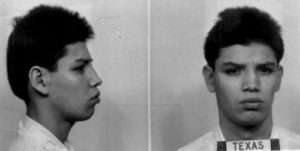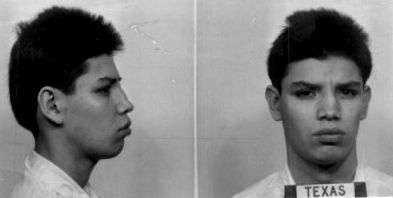Javier Medina was executed by the State of Texas for the murder of Dallas Officer Lawrence Rudy Cadena
According to court documents Lawrence Rudy Cadena was working undercover and had set up a drug buy. Javier Medina would walk up to the car and opened fire killing the Officer
Javier Medina would be arrested, convicted and sentenced to death
Javier Medina would be executed by lethal injection on August 14 2002
Javier Medina Photos

Javier Medina FAQ
When Was Javier Medina Executed
Javier Medina was executed on August 14 2002
Javier Medina Case
A Mexican national was executed Wednesday in Texas for the murder of a Dallas police officer after protests by the Mexican government that his rights under an international treaty were denied.
Javier Suarez Medina, 33, was pronounced dead at 6:23 p.m. after receiving a lethal injection for the murder of officer Lawrence Cadena during a 1988 undercover drug investigation. Suarez was the fifth Mexican citizen executed in Texas for murder.
In his final statement, Suarez spoke in English and Spanish, apologizing to the Cadena family, telling his brothers on death row to “keep your heads up,” and then thanking his family and the Mexican people for their support.
“I also want to carry each and every one of you in my heart,” he said in Spanish to the Mexican people. “If you are going to demonstrate I don’t want you to do anything crazy to these people. They have suffered enough. Long lives Mexico. Raise the flag of Mexico with honor. Thanks for everything, I love you.
arlier in the day the U.S. Supreme Court and Gov. Rick Perry rejected last-minute appeals from the Mexican government to halt the execution.
Without comment, the Supreme Court refused to hear arguments from attorneys who contended that Suarez was denied his rights to contact his nation’s consulate 14 years ago when he was arrested.
About an hour later Perry rejected his request for a 30-day reprieve.
“I have reviewed all of the information presented to me — including the issue of the international treaty,” the governor said. “My staff has met with Mexico government officials to hear their concerns about this case, and I have talked with Mexican President Vicente Fox about the matter. I respect the sovereignty of Mexico and itslaw, and I know that President Fox recognizes the sovereignty of U.S. and Texas law.”
It was reported Wednesday that President Fox might cancel his planned trip to Texas if the execution was carried out. Fox is scheduled to visit three Texas cities and meet with President Bush at his ranch near Crawford later this month.
Rodolfo Elizondo, communications director for President Fox, told The Dallas Morning News’s online edition that there was the possibility of a cancellation.
“The president’s State of the Union speech in Mexico is around the corner and so the conditions may not exist at this point for a trip under such difficult conditions … I don’t want to get ahead of myself, but I insist the conditions are not the most satisfactory if the execution takes place.”
Fox urged Perry to commute Suarez’ sentence to life in prison. Fox was instrumental last year in winning commutation for a Mexican national who was on Oklahoma’s death row.
Mexico opposes the death penalty and has protested the execution of its citizens in Texas before on similar international treaty grounds but never succeeded in stopping one.
Attorneys for the Mexican government contend Dallas authorities violated the Vienna Convention of Consular Relations, which requires that foreign nationals be advised that they can contact their consulates when they are arrested. Suarez was not advised.
At the Mexican Embassy in Washington on Monday, attorney Sandra Babcock charged that the execution of Suarez would “violate international law.” She is the lead attorney for the Mexican foreign ministry’s Mexican Capital Legal Assistance Program.
Dallas prosecutors said Suarez gave contradictory statements to investigators regarding his nationality at the time of his arrest. They also questioned why it took nearly 14 years for his attorneys to raise questions about his rights to contact the consulate.
The Texas Board of Pardons and Parole voted against commutation or a 90-day reprieve for Suarez on Tuesday and the Texas Court of Criminal Appeals on Monday rejected his latest appeal.
A Dallas County jury convicted and sentenced Suarez to death for the murder the 43-year-old Cadena, who was shot seven times with a Tec-9 semiautomatic weapon during an undercover drug operation in December 1988.
Cadena’s son, Lawrence Cadena Jr., said earlier he was prepared to finally put the execution behind him.
“It’s not going to bring my father back,” he said “When an individual commits a heinous act, you have to hold that person responsible. The penalty for this crime is death.”
Suarez, who was born in Piedras Negras, Mexico, moved to the United States at the age of 3, attending schools in Dallas but dropping out of high school. He admitted to police that he shot Cadena, but said he did not know he was a police officer.
Suarez was the 21st convicted killer executed this year in Texas and the 277 since the state restored the death penalty in 1982
https://www.upi.com/Archives/2002/08/14/Mexican-national-executed-in-Texas/3591029297600/








